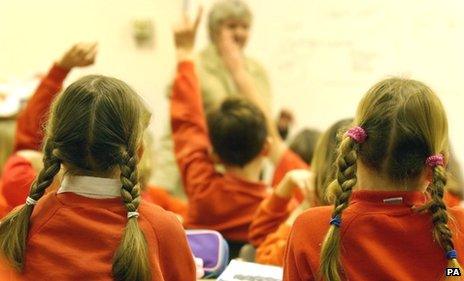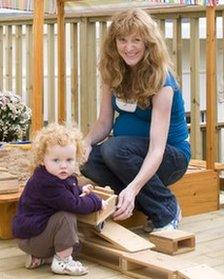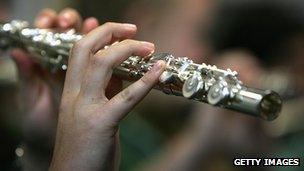The great school place sausage machine
- Published

Moving house. Signing up a tutor. Going to church more. The scramble for school places has always been a stressful affair, but now some parents, and particularly the middle classes, seem to be going to extraordinary lengths to get ahead of the game.
With almost one in six children failing to get into their first choice secondary school last year - and the primary school picture not looking much better - parents seem to be feeling the pressure to up the ante.
As hundreds of thousands of children in England find out whether they have a place at their secondary schools of choice, what tactics have some parents employed to secure the most sought-after?
From birth master plan

Moody-Stuart says schools have always been on her mind
Most parents tend to start thinking about primary schools the year before their children reach school age, but for some extreme planners, the strategy starts at conception.
Mother-of-two Elizabeth Moody-Stuart, 38, from Brighton, says her mind started racing the moment she first found out she was pregnant.
"When we knew kids were on the way we moved to a house which was within walking distance of the best state primary school and Brighton College, our preferred secondary school - it was part of the plan," she says. "I went to boarding school from the age of nine, so for me it was very important that my children had friends round the corner and had a sense of community."
Moody-Stuart, whose children are two and five months old, says she and her husband deliberately decided to buy "slap bang in the middle" of the schools' catchment areas.

Schools can play a part in deciding where to live
Janette Wallis, a senior adviser at the Good Schools Guide, says Moody-Stuart is part of a trend of ambitious parents who are planning their child's education earlier and earlier.
"In the state sector you can't put names down early, but some parents start planning to move house to be near the right school while their child is still in a pram. Conversely, many independent schools no longer work on the first come, first served basis, so registering a child at birth has become less common," she says.
Catchment area circus
Ever since it became apparent that some state schools were much better than others, catchment areas have driven demand for homes.
While upping sticks might not be a problem for the affluent, for the cash-strapped it can be a difficult decision which involves careful planning and considerable compromise. "There is often a property bubble around catchment areas. If a school makes a house more saleable or desirable, it can increase the value tremendously," says Peter Bolton King, chief executive of the National Association of Estate Agents.

Catchment areas can change yearly
Estate agents say many parents are prepared to take the hit, calculating the cost of a private education against the cost of mortgage repayments. But Justine Roberts, the co-founder of Mumsnet, says parents are sometimes vilified for being too pushy, leaving them feeling guilty about making the call.
Others simply cannot afford to move, and Wallis says the conundrum is causing some parents to stretch or break the rules. "Catchment area cheats reached a high water mark a couple of years ago - probably because the profile of punishments has been raised since then - but there are still plenty of parents who stretch the truth and many of them don't think of it as cheating," she says.
Attempts at trickery Wallis has come across include using a grandparent's address within the catchment area or renting a flat (or even a hotel room) within the catchment area and having mail redirected.
There is also non-catchment sharp practice, taking advantage of the rules on siblings and children with special needs.
Some parents pretend a cousin, or even an unrelated child with the same surname, is a sibling, Wallis says. Others have tried to wangle an unwarranted statement of special needs or medical problems.
Councils have been criticised for going too far in their efforts to check if the rules are being followed, with someeven hiring private investigators to follow families, external.
The tutorial trick
Parents are taking on tutors in increasing numbers to gear children up for passing grammar school entrance exams or other selective school tests.

To tutor or not?
Wallis says part of the demand is down to the knock-on effect of recession-hit parents - who might have once opted for private prep schools - turning to state primaries and "topping up with tutoring".
Grammar school catchment areas - such as parts of Buckinghamshire and Kent - are fertile ground for tutors, she says. "It is very hard to find a child at a grammar school in the whole of the UK that didn't have any private tutoring."
Anita Moss, director of First Tutors, which has 15,000 tutors on its books, says whereas 10 years ago traditional agencies would have been much more expensive, tutors can now be hired for £20 an hour.
Bonas MacFarlane, which charges £56-£75 an hour - on top of a £192 registration fee - says business is booming, with tutoring up 30% year on year.
With a fixed number of places and competition getting tougher, Roberts says the temptation is to tutor earlier and earlier. Sue Templeton, who runs Twist in the Tale, which runs tuition courses in verbal reasoning for the 11+ in Buckinghamshire, says their company is getting more inquiries from parents of children as young as five "keen to fill any gap that they think there is".
But the tutor trend is not just confined to grammar school aspirants. According to the Sutton Trust charity, nearly 25% of all 11-16-year-olds received some private or home tuition last year, compared with 18% in 2005.
The faith option
With faith schools frequently doing well in league tables, there is growing anxiety that many parents are exaggerating or even completely fabricating the nature of their religious affiliation.

There are almost 7,000 faith schools in England - 68% are Church of England and 30% are Catholic
Oversubscribed faith schools - which are allowed to give priority to applicants of its faith - usually seek proof of regular attendance at a relevant place of worship.
There are also certain religious milestones that children would have been expected to do at the appropriate age, such as baptism for Roman Catholic primary schools and first communion for secondary schools.
While some parents see no problem with the process, others suggest it is not only unfair, but also puts parents in a very difficult situation.
Andy Hamilton, a father of two from Reigate, Surrey, says parents in the area where he lives "have no choice, you either pray or pay".
"Through no fault of their own... this frankly disgusting situation has turned the parents into hypocrites as they do anything to get their children into [the local Catholic school]," he says.
The musician, who is not religious, says his family have been "extremely financially challenged" after they sent their 16-year-old to an independent school because the only state options were a faith school or a school "situated close to a housing estate fraught with social problems".
"I cannot help but feel this is not only an injustice, a kind of religious prejudice, but a grotesque misuse of taxpayers' money," he says.
Hamilton is not alone. British Humanist Association campaigner Richy Thompson argues "faith schools can also be socio-economically selective, with richer parents more likely to manipulate the system".
But both the Catholic Church and the Church of England deny any suggestion that parents start going to church to manipulate the admissions criteria, or that faith schools are socio-economically selective.
Becoming an appeal lawyer
Those who don't get their first choice can appeal. With well over half of appeals failing and the number of appeals against primary school admissions at an all-time high, it might seem like a daunting task.
But for Lisa, a 39-year-old mother of two from St Neots, in Cambridgeshire, it was well worth putting up a fight.
She says her situation was slightly complicated because she wanted to move counties for a relationship - but would only do so if her eldest, who was 11 at the time, got into a good school.
"I found a house I wanted to buy in the catchment area, which was about £50,000 to £70,000 more expensive than just outside - even though the houses were smaller - gave my rent notice and put in an offer.
"But at the point of exchange I was 35th on the waiting list for the senior school, and first on the junior school waiting list for my youngest, so I held off exchanging contracts and appealed against both," she says.
Lisa says she was advised that if she appealed on the basis of the needs of her eldest child, because she was so far down the waiting list, she would have no chance. But if she could prove the school would not be adversely affected by taking one more child, she might have a stab at it.
For the next six weeks, she says she researched previous class sizes, whether they had done well in the stats, how many teachers and teaching assistants there had been, classroom sizes and buildings.
"In the end I won on a technicality because I found that three classrooms weren't being used, which showed the school was not full."
Lisa appreciates the other 34 parents on the waiting list would probably not be too impressed by her actions, but she says she has no qualms about "doing what she had to do".
"I'm not overly educated. You get out what you put in. For me it was absolutely worth it. I've had a few years as a single parent, and it focused my attention on what was important - my children have always been and always will be my number one priority," she says.
Lisa says the appeal was one of the most stressful times of her life, but she would advise anyone who gets declined to go for it.
Home stimulus
Education expert Prof Stephen Heppell, from Bournemouth University, believes that people who channel all their energy into catchment areas or getting into faith schools are missing the point.

Alice Griffin says her daughter is developing a passion for horses
He thinks what happens inside the home - especially during the first three years of a child's life - will have far more bearing on their future.
"For example all the research is unequivocal that too much television is catastrophic. Children should watch no more than 30 minutes of television a day - interactivity on phones or iPads is fine - they need to be engaged," he says.
Heppell says parents often run away from small schools, but in his opinion, they are the best.
"If your dog dies, teachers will know you had one and what its name was - there is a level of intimacy, teachers, parents and pupils all know each other," he says.
And Heppell thinks it is important to try to find something that children are successful at.
"Whether it is cycling, piano, baton twirling or a marching band, help them to develop a skill, so that they can carry that confidence into school."
Author and freelance writer Alice Griffin, 36, agrees that education starts at home. She is currently home schooling her daughter, who is nearly five, although not just in the traditional sense, as the family frequently travels.

Help your child turn an interest into a skill
"My take is that education happens all the time in all places and that parents can often be the facilitators of this education.
"For instance I will be travelling to Italy for a month's farm volunteering with my daughter this year and our personal view is that this will provide a wonderful educational experience in itself.
"I expect on a practical level she will learn about caring for animals, food growing and preservation, making wool, making cheese and of course the environment and how to best care for it.
"These experiences lead to lessons in respect, compassion, independence, problem solving, developing a passion. Plus, the lessons a child can take simply from playing out in nature are immeasurable in my opinion," she says.
We moved house, from a bigger house we liked, for one reason only, because we knew we would have a near-impossible task of getting a place for our daughter at a decent school. We got the place we wanted. We are an ordinary family, with two incomes but certainly not what might be termed well-off, and all we want for our two children is a decent all-round education in a mixed school, where they are happy and able to thrive. It's not too much to ask, and I think any parent should be able to expect, even 'demand', the same for their child, as a human right.
H, Herts
We have just been through this whole exercise and feel let down by the primary school. Hence, forced to use several private tutors to fill in the gaps where my son was let down by the school.
As for the tutors a lot of them don't actually teach anything. Just carry a bank of past papers and charge on average £20 an hour. The best tutor who contributed to 90% of my sons learning had a different approach and broke down many of the bad habits picked up at school. A lot of parents may not appreciate the money we spent but I'd rather we did this now for my son then handing him a lump sum when he is much older. This way he gets a massive boost up the education ladder by gong to an outstanding grammar school.
S Patel, Berks
My parents moved in with my grandmother so my sister, brother and I could go to better schools in a different area. My brother was very shy and by Year 3 could barely read despite my mother spending a lot of time after school trying to help him. When we moved he improved greatly and made a lot of friends. I on the other hand struggled to make friends at the same primary school. I went from being bubbly and confident with a large group of friends to a quiet and introverted loner. The move ruined my confidence and affected me all the way throughout high school. I got a much better education but suffered as my self-esteem crumbled. My teenage years were some of the loneliest of my life.
Jessica, Manchester
My brother and his wife are basically pretending to be Christians and attending church every week without fail, all so that they can improve their chances of getting their daughter into what they consider the best school in the area, which happens to be a church school in a suburb of Bristol. Their friends are also doing the same thing for their own kids. What I find fascinating is the possibility that religious groups running church schools take advantage of parents' anxieties in order to gain the hearts and minds of the next generation.
Richard, London
I wish to take issue with some of the comments made in the tutorial section of this article. Whilst I do not doubt for one moment that many use tutors, to say something as sweeping as "It is very hard to find a child at a grammar school in the whole of the UK that didn't have any private tutoring" is extremely inaccurate and rather insulting. If she wants to find such a child come to Ashford in Kent. My daughter has just secured a place at the local girls grammar school, along with 10 others in the same primary - none of whom had private tutoring. Four years ago my son won a place in the local boys grammar school - again neither he nor any of his friends from the same primary school (my recollection is that this was 12 boys) had tutoring.
Dr Trilsbach, Kent
I live in a middle class area near to a primary school which on the surface seems to be very good. However, after a long battle to get my children into this sought after school, I realised that the school is not as good as it seemed. The good Sats results are largely due to a lot of extra private tuition paid for by parents (and parental input) and not due to brilliant teaching. If I had known now what I know about the school, I would have chosen a different school, which on the surface probably doesn't look quite as good, but it appears that the teaching is probably better because the Sats results are just below my childrens' school but the population is more mixed (a mixture of socio-economic groups).
Sarah, London
Anyone who moves closer to a school (particularly a secondary) on conception of their child is really stupid. As any parent who has any experience can tell you a school can change dramatically over time, (based on different staff, change in demographics, different governing body). Had we done this when my son was born we would now be living in the "wrong" catchment, as the primary school that was considered "best" then is now considered second or third best. Similarly I know parents who have refused point blank to even visit one of the secondary schools in the area, based on nothing more than hearsay and extremely old information.
Children who are supported by parents who are active in their education will always achieve. Parents can help a school to improve in so many ways, helping out, being a governor, (schools are always looking for governors), fund raising, there is so much that can be done.
Tim, Southampton
We took a residential job whilst our children were at primary school and rented out our home that was in the catchment for the school of our choice. When we needed to apply for secondary school we decided to move back home partly to get our daughter into that school. We got the place at the 'best' school that we wanted but within 18 months it was clear that this was the wrong decision and moved her to another school where she is now thriving. This experience showed me that some schools 'live off' their reputation which is not always deserved and just because a school is not over subscribed does not mean it should be ruled out! I don't regret moving house for other reasons but I think people get huge pressure to get into the 'best' schools which is not always a true picture.
Cathryn, Taunton
I am originally from Burnley, Lancashire, my mother had me at a very young age. An intelligent woman but due to bad circumstances she was left young, skint and bringing up a child on her own. The schools in my area were "rough" to say the least; in special measures, truancy etc. The only good state secondary school was Catholic, and so my non-religious mother got me baptised at the age of three, took me to church, communion etc, and I went to the catholic school (private was not an option) all the time not believing in God what so ever (still an a Atheist now) and I can whole heartedly say that if I didn't, my life would be very different. I gained good qualifications, went to university, and now have a very good graduate job at the age of 22. The kids who I grew up with on my council estate, all for the most part had kids at the age of 16, and came out with no better than a C grade at GCSE. If parents have to lie and cheat the system to make sure their children get a decent education, we need to be pointing the fingers at the education system its self and not the parents. A child born into a family with money and connections will receive a better education. There should be no discrimination in education (of course there always will be) in an ideal world every child would receive the same high standard across the country, not just those born into wealth. In the meantime the poorer ones have to do whatever they can.
Sandie, Woking
I agree with Alice, doing it yourself means you get to be involved in your child's education in a way that waving them off at the school gate can't match. It's an increasingly-popular option too, and means you don't have to compete for the best house or be creative about applying for a school place.
David, Cambridge